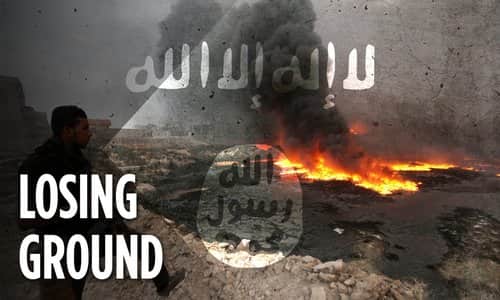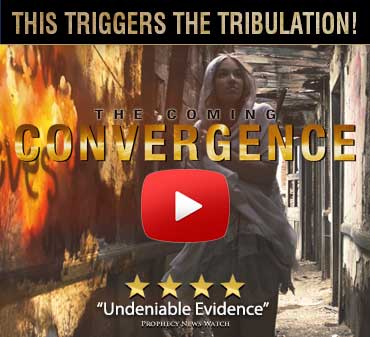ISIS Losing the Battle But Winning The War?
 By Giulio Meotti/Gatestone Institute June 27, 2017
Share this article:
By Giulio Meotti/Gatestone Institute June 27, 2017
Share this article:
The Islamic State is crumbling -- if too slowly. More than two
years have passed since French President François Hollande promised, "We
will bomb Raqqa". Sooner or later, ISIS will probably be reduced to a
small enclave with no territorial continuity, and its chief, Abu Bakr al
Baghdadi, will be eliminated.
It would,
nevertheless, be most dangerous to dismiss these three years as a short
parenthesis: Nazism did not last as long: "just" 12 years in power and
five at war with the rest of Europe. The physical and cultural
consequences of the Nazi tyranny are, unfortunately, still visible in
Europe.
The same will be said of the Islamic
State. Three years of terror and conquests are not bad in for a war
between the Caliphate vs. everyone else.
ISIS
will leave behind an unprecedented terrorist infrastructure (277
Europeans killed on European soil in two years). If ISIS is retreating
in Mosul, it is rapidly advancing in Manchester.
The
Caliphate is winning its war in Europe. Six months ago in the Britain,
the rise of Jeremy Corbyn, the ultra-pacifist Labour party leader who
blamed the "war on terror" for the recent attacks in Manchester and
London, would have been unthinkable. His success is clearly linked to
the recent bloodshed in British streets.
In the
West, ISIS has assailed parliaments in Ottawa, cafés in Copenhagen,
beaches in Nice, social centers in San Bernardino, metros and airports
in Brussels, music festivals in Manchester, theaters, sports stadiums,
restaurants and kosher markets in Paris, churches in Rouen, Christmas
markets in Berlin, malls in Stockholm. Not bad for a "JV team", as
Barack Obama called the Caliphate.
ISIS has been an unparalleled attraction for the umma,
the world community of the Islamic faithful: about 30,000 Muslims around
the world -- 6,000 from Europe -- have left their homes to fight under
the deadly black flag of the Caliph.
ISIS was
able to build a global network of terror. Jihadist groups such as Ansar
Bayt al-Maqdis in Egypt, Abu Sayyaf in the Philippines, Ansar al-Sharia
in Libya, Boko Haram in Nigeria, the Caucasus Emirate in Russia, and the
Islamic Movement of Uzbekistan, along with others, have all pledged
allegiance to ISIS.
The Caliphate has also
become the wealthiest terror group in history. Sebastian Gorka, a White
House advisor on radical Islam, said: "The attacks of September 11,
2001, cost barely $500,000. ISIS makes that in six hours! Do you feel
safe?"
ISIS has made evil viral. The world was
stunned when ISIS submerged the Western imagination in the public
executions of journalists, the massacres of captured troops, markets for
sexual slavery, executions of gays, and public drownings, burning
people alive and crucifixions.
"Never before
in history have terrorists had such easy access to the minds and
eyeballs of millions", wrote Brendan Koerner, noting that "ISIS is
winning the social media war".
Often, evil
works. A few weeks ago, in Paris, a Jewish woman, Sarah Halimi was
killed by a Muslim shouting "Allahu Akbar". The case was barely covered
by the mainstream press.
Then several French
intellectuals demand the authorities to denounce it as a case of
anti-Semitism. ISIS's threats are now so intense that even academic
experts of Islam, such as Gilles Kepel, are under police protection.
In
a few months, the Islamic State cleared the historic colonial border of
Sykes-Picot, conquered half of Syria, destroyed entire cities of prices
antiquities such as Palmyra, reached the periphery of Baghdad, and
kicked out the Iraqi army, in which the United States had invested 25
billion dollars.
That is why many counter-terrorism analysts are intelligently asking if "ISIS is winning".
ISIS's
main legacy, however, is devastation -- both cultural and human. ISIS
has been successful in making a blank slate, a sort of Islamic "year
zero," in which, after an apocalypse, history will start again --
supposedly virgin and pure.
The Caliphate will
leave behind a Middle East more and more Islamic, not only in the
landscape, but also in demography. ISIS swept away entire non-Muslim
communities that will never return.
Many
Christian and Yazidi towns within its orbit will remain permanently
empty due to the slaughter, the exile and the disappearance of
survivors. The Islamic State has been able to destroy the ancient
Christian community of Mosul.
A new study
published in the weekly magazine Plos Medicine concluded that around
10,000 members of the ethnic and religious Yazidi minority were killed.
The researchers estimated that 6,800 other Yazidis were kidnapped, with
more than one third still missing.
"Christianity
in Iraq is over", said Canon Andrew White, the great Anglican vicar of
Baghdad. ISIS succeeded, for the first time in 2000 years, in cancelling
Christian communion in Nineveh.
Professor
Amal Marogy, a native of Iraq, said, at a conference at the Hudson
Institute, that while infrastructure such as the Mosul Dam can be saved
from ISIS, the eradication of the Christian presence in Iraq means "the
end of a peaceful civilization".
There are commentators who are now noting that "ISIS wins when Christians leave the Middle East".
The
jihadist recently vandalized ancient Roman statues and artifacts at the
Syrian archaeological site of al-Salhiye, known as Dura Europos. ISIS
devastated the most famous capitals of ancient Mesopotamia, from Nimrud
to Hatra.
"This destruction is unprecedented
in recent history", according to Marina Gabriel, coordinator of the
American Schools of Oriental Research Cultural Heritage Initiatives, an
institute that tracks the destruction of Islamic State.
The Nimrud ziggurat, built almost 2900 years ago -- the
most spectacular sacred structure known in ancient Mesopotamia -- does
not exist anymore. ISIS terrorists devastated the Mosul Public Library,
where 10,000 manuscripts were burned or stolen. ISIS also managed to
erase of the entire Jewish history of Mosul, including the tombs of
Jonah, Seth and Daniel.
The Caliphate
destroyed the first Assyrian city, Khorsabad. The greatest devastation,
however, took place in Palmyra, the most important archaeological jewel
of the Middle East. Palmyra delenda est.
The
Islamic State also eliminated thousands of years of Syrian and Iraqi
history, pulverizing exquisite ancient treasures such as the temple of
Bal.
As the Caliphate razed to the ground
everything in its path, Europe reacted as if that were just the result
of regrettable manners that should not concern her. The Islamists,
however, had other plans. Professor Paul Veyne writes in his book on
Palmyra:
"Why, in August 2015, did ISIS need to
blow up and destroy that temple of Baalshamin? Because it was a temple
where pagans before Islam came to adore mendacious idols?
No,
it was because that monument was venerated by contemporary Westerners,
whose culture includes an educated love for 'historical monuments' and a
great curiosity for the beliefs of other people and other times.
And
Islamists want to show that Muslims have a culture that is different
from ours, a culture that is unique to them. They blew up that temple in
Palmyra and have pillaged several archaeological sites in the Near East
to show that they are different from us and that they don't respect
what Western culture admires".
That is why,
after Palmyra, the Islamic State attacked music halls and other Western
symbols in Europe. The "JV team" might be losing ground, but so far it
is winning the war of civilizations.
Will the West be able not only to free Raqqa and Mosul, but also to reverse this cultural avalanche trying to crush it?
Originally published at Gatestone Institute - reposted with permission.

No comments:
Post a Comment